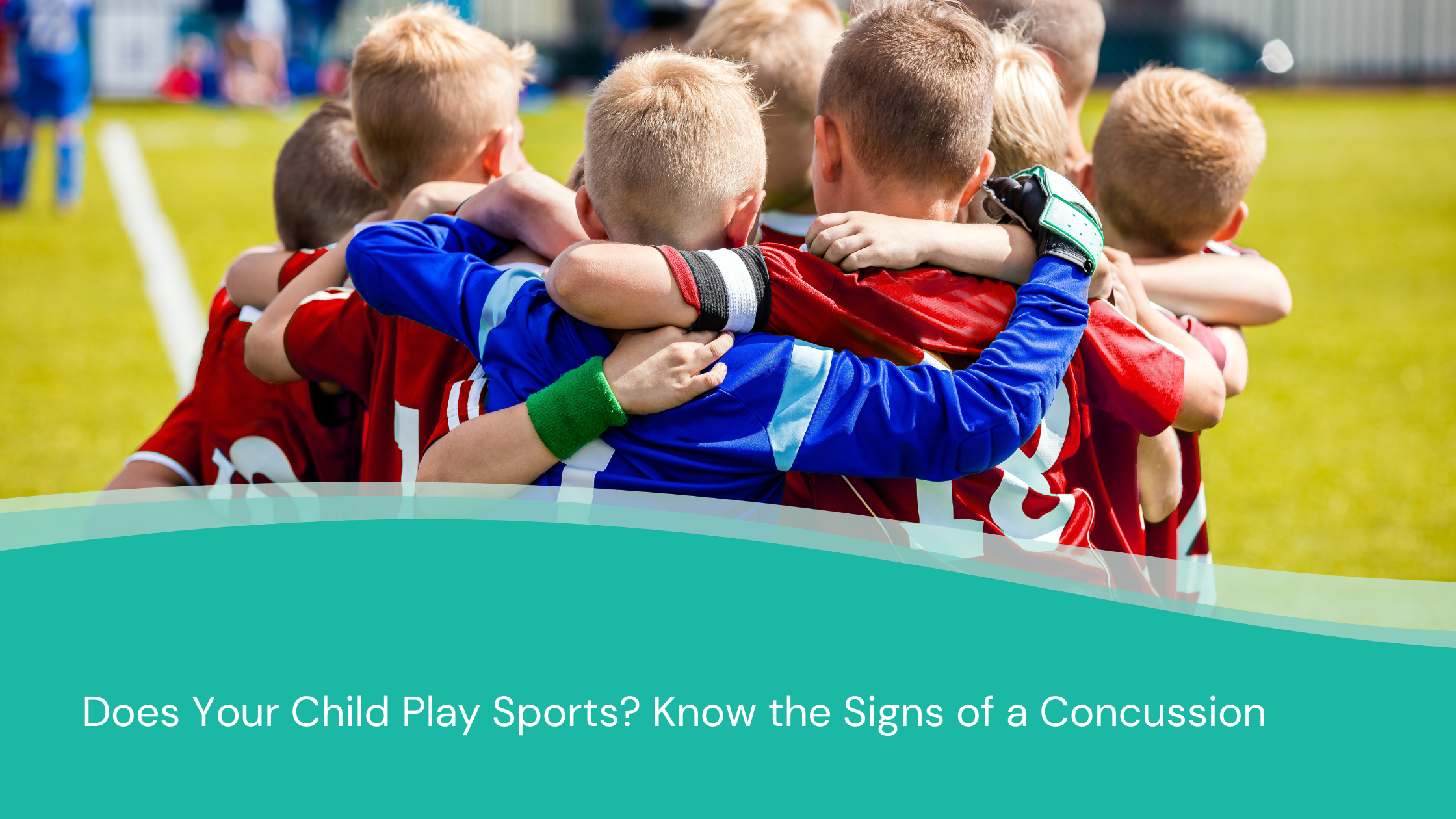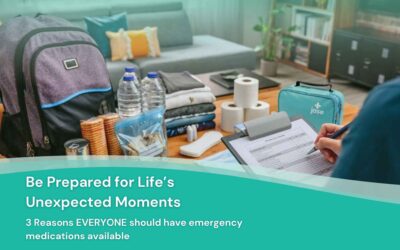When Disaster Strikes, It’s Not Hunger or Thirst That Takes the First Lives In every disaster zone, from hurricanes in the Caribbean to war zones in Ukraine, the pattern is the same. People worry about food and water, but it’s infection that kills first. A small wound...
Does Your Child Play Sports? Know the Signs of a Concussion

A concussion is a type of traumatic brain injury—or TBI—caused by a bump, blow, or jolt to the head or by a hit to the body that causes the head and brain to move rapidly back and forth. This sudden movement can cause the brain to bounce around or twist in the skull, creating chemical changes in the brain and sometimes stretching and damaging brain cells.
Most symptoms resolve in a few days, but sometimes symptoms can persist for weeks or even longer. Common symptoms after a concussive traumatic brain injury are headache, loss of memory (amnesia), and confusion.
The most common cause of concussions in children is sports-related activities. According to the Centers for Disease Control and Prevention (CDC), sports and recreational activities account for over 70% of all traumatic brain injuries (TBIs) among children and adolescents. This includes activities such as football, soccer, basketball, baseball, hockey, skateboarding, and bicycling. Other causes of concussions in children include falls, motor vehicle accidents, and physical abuse.
Sports Related Concussions – most common cause of concussions in youth
The American Association of Pediatrics (AAP) published a clinical report titled, “Sports Related Concussion in Children Adolescents” where they outline definition, symptoms and treatment protocols currently being developed for sports related concussions.
Highlights of this paper include:
- Sports-related concussions (SRC) are a major concern. A recent study that evaluated 3 national injury databases estimated that 1.1 million to 1.9 million recreational concussions and SRCs occur annually in the United States in children 18 years of age or younger.
- SRC may be caused by a direct blow to the head, face, neck, or elsewhere on the body with an impulsive force transmitted to the head.
- SRC typically results in the rapid onset of short-lived impairment of neurologic function that resolves spontaneously. However, in some cases, signs and symptoms may evolve over a number of minutes to hours.
- SRC may result in neuropathologic changes, but the acute clinical signs and symptoms largely reflect a functional disturbance rather than a structural injury, and as such, no abnormality is seen on standard neuroimaging studies.
- SRC results in a range of clinical signs and symptoms that may or may not involve loss of consciousness.
- The clinical signs and symptoms cannot be explained by drug, alcohol, or medication use; other injuries (such as cervical injuries, peripheral vestibular dysfunction, etc); or other comorbidities (eg, psychological factors or coexisting medical conditions).
When a concussion is suspected:
If the concussion is suspected while playing sports, you should:
- Remove the child from play
- Keep the child out of play the day of the injury and until a medical provider
- Children or teens who return to play too soon—while the brain is still healing—risk a greater chance of having a repeat concussion. Repeat or later concussions can be very serious. They can cause permanent brain damage, affecting your child for a lifetime.
Symptoms of concussion may not be obvious. It may take a day or 2 for symptoms to appear.
Most concussions resolve completely; however in some instances symptoms can last for 2 or more weeks. Seek immediate medical attention if:
- If unconscious for any amount of time following blow to head, even if there are no signs of concussion, seek medical attention as soon as possible.
- Headache is worse or does not go away.
- Slurred speech, weakness, numbness, or decreased coordination
- Significant nausea or repeated vomiting
- Seizures
- Loss of consciousness
- Inability to wake up
- Symptoms have worsened at any time
- Symptoms have not gone away after 10-14 days
- History of multiple concussions
Post concussion syndrome
Approximately 90% of concussion symptoms are temporary, with symptoms resolving within 10 to 14 days, but may linger for weeks. Post concussion syndrome occurs when symptoms persist past 3 months. Fifteen percent of concussion patients will suffer from post-concussion syndrome. There is no specific treatment for post-concussion syndrome, however symptoms can be managed by medication, stress reduction, avoiding alcohol, and staying on a sleep schedule.
Even though symptoms may last for an extended time, most experience complete healing and are symptom free.
Management of Concussion
Training for sports-related injuries for staff and support personnel should be mandatory. There are some instances where you may not be able to access medical attention for an extended period. Being prepared for any emergency is prudent. Know what to do if there isn’t immediate access to clinic or hospital services.
When a head injury occurs (concussion or other injury), suspect a neck injury, and treat it as if one has been sustained. This includes careful immobilization of neck and applying a cervical collar (which should be in your first aid kit). It is best to learn and practice this skill from a medically trained professional or take a course in basic first aid.
If no loss of consciousness:
- Have the child rest, which means avoiding physical activities such as sports, strenuous work, etc.
- Limit activities that require mental concentration-video games, schoolwork, reading, computer use or texting.
- Monitor child for any changes in concentration, headaches, focus, or other changes in behavior.
- Child may need to be on a modified or half day schedule while healing. Discuss this with their primary care provider. The stimulation from school and activities can overwhelm someone with a concussion.
- Child will need a return to activities clearance before returning to sports.
Prevention
- All players need to be fitted with protective sports equipment- helmets, mouth guards, etc.
- Maintain and check protective sports equipment periodically. Discard and replace worn or old equipment.
- Mandatory, periodic training on head injuries and concussion management to sports coaches, parents and those involved with sports activities on signs of a concussion and what to do if a concussion is suspected.
- Limit contact during practice when appropriate.
- Post signs and symptoms of a concussion and what to do if a concussion is suspected in public areas around the field of play and inside locker rooms.
- Brooke Lounsbury, RN
Medical Content Writer
Lifesaving Medications
Everyone should be empowered to care for themselves and their loved ones during the unexpected.
Recent Posts
Keeping you informed and safe.
Medical Readiness: What Really Kills First
Exploring Dr. William Makis’ Hybrid Orthomolecular Cancer Protocol: Focus on Ivermectin and Mebendazole/Fenbendazole
Exploring Dr. William Makis’ Hybrid Orthomolecular Cancer Protocol: Focus on Ivermectin and Mebendazole/Fenbendazole *Disclaimer: This article is for educational purposes and does not constitute medical advice. Always seek professional guidance.* In the evolving...
Be Prepared for Life’s Unexpected Moments
3 Reasons EVERYONE should have emergency medications avaiable. It's all about access—access to medications and care when you need it most. And when things happen outside of your control that access can disappear.Below are 3 examples of how easily this access can be...
Youth Preparedness: Teaching, Building, and Coping with Disasters
Educating and preparing your children ahead of time means fewer surprises in the event of an emergency.Growing Up Prepared: Empowering Youth in Disaster Preparedness As we observe National Preparedness Month, it's crucial to remember that disasters can strike at any...




